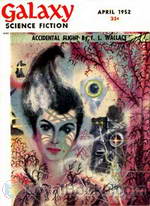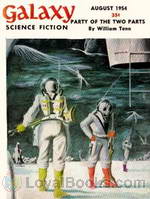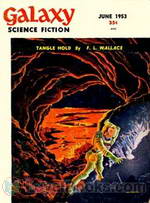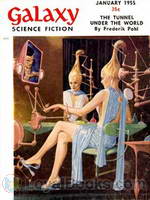|
Books Should Be Free Loyal Books Free Public Domain Audiobooks & eBook Downloads |
|
|
Books Should Be Free Loyal Books Free Public Domain Audiobooks & eBook Downloads |
|
Science |
|---|
|
Book type:
Sort by:
View by:
|
By: Everett B. Cole (1918-1977) | |
|---|---|
 The Weakling
The Weakling
| |
 Millennium
Millennium
| |
 The Players
The Players
| |
By: F. Arthur Sibly | |
|---|---|
 Youth and Sex
Youth and Sex
| |
By: F. E. Hardart | |
|---|---|
 The Beast of Space
The Beast of Space
| |
By: F. St. Mars (1883-1921) | |
|---|---|
 The Way of the Wild
The Way of the Wild
| |
By: Fabian Franklin | |
|---|---|
 What Prohibition Has Done to America
What Prohibition Has Done to America
In What Prohibition Has Done to America, Fabian Franklin presents a concise but forceful argument against the Eighteenth Amendment of the U.S. Constitution. Beginning in 1920, this Amendment prohibited the sale and manufacture of alcoholic beverages in the United States, until it was repealed in 1933. Franklin contends that the Amendment “is not only a crime against the Constitution of the United States, and not only a crime against the whole spirit of our Federal system, but a crime against the first principles of rational government... | |
By: Fannie Hardy Eckstorm (1865-1946) | |
|---|---|
 The Woodpeckers
The Woodpeckers
The Woodpeckers is a wonderful introduction to the world of bird study for the young naturalist, covering such topics as how he finds food, courting, how he builds his nest, the interesting ways he uses his different body parts as tools, among other topics discussed in the book. If you wish to investigate further, the book has a few diagrams and an Appendix that contains more technical information such as detailed descriptions of the different species of North American woodpeckers which were not read as part of this audiobook. | |
By: Ferdinand Heinrich Grautoff (1871-1935) | |
|---|---|
 Banzai! by Parabellum
Banzai! by Parabellum
| |
By: Fflorens Roberts | |
|---|---|
 Fifteen Years with the Outcast
Fifteen Years with the Outcast
| |
By: Florence Daniel | |
|---|---|
 Food Remedies Facts About Foods And Their Medicinal Uses
Food Remedies Facts About Foods And Their Medicinal Uses
| |
By: Florence Nightingale (1820-1910) | |
|---|---|
 Notes on Nursing
Notes on Nursing
Notes on Nursing was published in 1859 and is a fascinating view into the theories underpinning the early development of modern nursing and public health reform by "the Lady with the Lamp", Florence Nightingale. Emphasising common sense and thought for the patient's care in many more ways than just administering physician-prescribed medicines, this is still a very relevant book for those interested in health or caring for the sick and infirm today.Summary by Cori Samuel. | |
 Notes on Nursing What It Is, and What It Is Not
Notes on Nursing What It Is, and What It Is Not
| |
By: Floyd L. Wallace (1915-2004) | |
|---|---|
 Accidental Flight
Accidental Flight
| |
 The Impossible Voyage Home
The Impossible Voyage Home
| |
 Forget Me Nearly
Forget Me Nearly
| |
 Student Body
Student Body
| |
 Second Landing
Second Landing
| |
 Tangle Hold
Tangle Hold
| |
 Bolden's Pets
Bolden's Pets
| |
 Mezzerow Loves Company
Mezzerow Loves Company
| |
By: Follett L. (Follett Lamberton) Greeno (1889-) | |
|---|---|
 Obed Hussey Who, of All Inventors, Made Bread Cheap
Obed Hussey Who, of All Inventors, Made Bread Cheap
| |
By: Forrest J. Ackerman (1916-2008) | |
|---|---|
 Out of This World Convention
Out of This World Convention
| |
By: Frances Swain | |
|---|---|
 Food Guide for War Service at Home
Food Guide for War Service at Home
"The long war has brought hunger to Europe; some of her peoples stand constantly face to face with starvation. To meet all this great food need in Europe—and meeting it is an imperative military necessity—we must be very careful and economical in our food use here at home. We must eat less; we must waste nothing; we must equalize the distribution of what food we may retain for ourselves; we must prevent extortion and profiteering which make prices so high that the poor cannot buy the food they actually need; and we must try to produce more food... | |
By: Francis Bacon (1561-1626) | |
|---|---|
 The New Atlantis
The New Atlantis
In 1623, Francis Bacon expressed his aspirations and ideas in New Atlantis. Released in 1627, this was his creation of an ideal land where people were kind, knowledgeable, and civic-minded. Part of this new land was his perfect college, a vision for our modern research universities. Islands he had visited may have served as models for his ideas. | |
 Valerius Terminus; of the interpretation of nature
Valerius Terminus; of the interpretation of nature
| |
By: Francis Bowen (1811-1890) | |
|---|---|
 A Theory of Creation: A Review of 'Vestiges of the Natural History of Creation'
A Theory of Creation: A Review of 'Vestiges of the Natural History of Creation'
| |
By: Francis C. (Francis Cowles) Frary (1884-) | |
|---|---|
 Laboratory Manual of Glass-Blowing
Laboratory Manual of Glass-Blowing
| |
By: Francis C. Woodworth (1812-1859) | |
|---|---|
 Stories about Animals: with Pictures to Match
Stories about Animals: with Pictures to Match
| |
By: Francis Darwin (1848-1925) | |
|---|---|
 The Power of Movement in Plants
The Power of Movement in Plants
| |
By: Francis Edward Younghusband (1863-1942) | |
|---|---|
 The Heart of Nature or, The Quest for Natural Beauty
The Heart of Nature or, The Quest for Natural Beauty
| |
By: Francis Kermode (1874-) | |
|---|---|
 Catalogue of British Columbia Birds
Catalogue of British Columbia Birds
| |
By: Francis M. Walters | |
|---|---|
 Physiology and Hygiene
Physiology and Hygiene
Physiology and Hygiene for Secondary Schoolsby Francis M. Walters, A.M.PREFACE The aim in the preparation of this treatise on the human body has been, first, to set forth in a teachable manner the actual science of physiology; and second, to present the facts of hygiene largely as applied physiology. The view is held that right living consists in the harmonious adjustment of one's habits to the nature and plan of the body, and that the best preparation for such living is a correct understanding of the physical self... | |
By: Francis Rolt-Wheeler (1876-1960) | |
|---|---|
 The Boy with the U. S. Weather Men
The Boy with the U. S. Weather Men
| |
By: François Arago (1786-1853) | |
|---|---|
 Biographies of Distinguished Scientific Men First Series
Biographies of Distinguished Scientific Men First Series
| |
By: François Huber (1750-1831) | |
|---|---|
 New observations on the natural history of bees
New observations on the natural history of bees
| |
By: Frank Allaben (1867-1927) | |
|---|---|
 Concerning Genealogies
Concerning Genealogies
Written over a century ago, this comprehensive book offers insight into the methods used to research and compile a family history. As stated in the preface of the book, "Strong emphasis is laid upon the importance of employing the historical method..." which is sorely lacking in today's computerized compilations. - Summary by Roger Melin | |
By: Frank Banta | |
|---|---|
 Droozle
Droozle
| |
By: Frank Belknap Long (1903-1994) | |
|---|---|
 The Man from Time
The Man from Time
| |
 The Mississippi Saucer
The Mississippi Saucer
| |
 The Man the Martians Made
The Man the Martians Made
| |
 The Calm Man
The Calm Man
| |
 The Sky Trap
The Sky Trap
| |
By: Frank Henderson | |
|---|---|
 Six Years in the Prisons of England
Six Years in the Prisons of England
A Merchant talks about daily life inside prisons of England, describes routines and how prisoners are treated. He notes stories of how fellow prisoners came to be in prison, and his ideas about the penal system, its downfalls and ways to improve it. The reader can see similarities to the problems we still have in regarding "criminals" today. (Introduction by Elaine Webb) | |
By: Frank Herbert (1920-1986) | |
|---|---|
 Old Rambling House
Old Rambling House
| |
 Operation Haystack
Operation Haystack
| |
By: Frank M. Robinson (1926-) | |
|---|---|
 Decision
Decision
| |
By: Frank Richard Stockton (1834-1902) | |
|---|---|
 The Great War Syndicate
The Great War Syndicate
| |
 The Great Stone of Sardis
The Great Stone of Sardis
| |
 Round-about Rambles
Round-about Rambles
ROUND-ABOUT RAMBLES, In Lands of FACT AND FANCYBY FRANK R STOCKTONPREFACECome along, boys and girls! We are off on our rambles. But please do not ask me where we are going. It would delay us very much if I should postpone our start until I had drawn you a map of the route, with all the stopping-places set down. We have far to go, and a great many things to see, and it may be that some of you will be very tired before we get through. If so, I shall be sorry; but it will be a comfort to think that none of us need go any farther than we choose... | |
By: Frank W. Coggins | |
|---|---|
 Say "Hello" for Me
Say "Hello" for Me
| |
By: Frantz Funck-Brentano (1862-1947) | |
|---|---|
 Princes and Poisoners: Studies of the Court of Louis XIV
Princes and Poisoners: Studies of the Court of Louis XIV
The court of French King Louis XIV was not a safe place to be. It was filled with plots and intrigues, leaving observers and commentators with more questions than answers among speculation and innuendo. Funck-Brentano was a scholar, librarian and expert on the political climate of eighteenth century France. Backing up his work with research in the archives of the Bastille, he attempts to explain and throw light on the tumultuous times. - Summary by Lynne Thompson | |
By: Frederic Austin Ogg (1878-1951) | |
|---|---|
 The Governments of Europe
The Governments of Europe
| |
By: Frédéric Houssay (1860-1920) | |
|---|---|
 The Industries of Animals
The Industries of Animals
| |
By: Frederic Lucas (1852-1929) | |
|---|---|
 Animals of the Past
Animals of the Past
Prior to the emergence of paleontology and comparative anatomy as scientific disciplines at the end of the 18th century, it was generally known that there were species of animals that had disappeared completely. The term "extinction" originally applied to the extinguishing of fires or erasing of one's debt. It was not until 1784 that the term extinction was used to denote the complete eradication of a species of living being. In 1901, Frederic A. Lucas penned an overview of vertebrate animals whose only evidence of being remained in fossil records. The book focuses primarily on vertebrate animals, from fish to mammals. - Summary by Jeffery Smith | |
By: Frederic Max | |
|---|---|
 Rex Ex Machina
Rex Ex Machina
| |
By: Frederick G. Aflalo (1870-1918) | |
|---|---|
 Birds in the Calendar
Birds in the Calendar
Delightful sketches of British wild birds – a bird for every month of the year from the pheasant in January to the robin in December. This collection of articles, reprinted in book form from the periodical The Outlook, is full of fascinating information about bird behaviour and habitat, as well as many interesting anecdotes. Out of date in some respects, particularly in its reference to the (now illegal) collecting of birds’ eggs, this book brings home forcefully how the populations of some British wild birds have declined since it was written. | |
By: Frederick John Lazell (1870-1940) | |
|---|---|
 Some Summer Days in Iowa
Some Summer Days in Iowa
| |
 Some Spring Days in Iowa
Some Spring Days in Iowa
| |
By: Frederick John Melville (1882-1940) | |
|---|---|
 The Postage Stamp in War
The Postage Stamp in War
| |
 Gambia
Gambia
| |
By: Frederick Schwatka (1849-1892) | |
|---|---|
 In the Land of Cave and Cliff Dwellers
In the Land of Cave and Cliff Dwellers
An adventurer and explorer of no mean repute, Lieutenant Frederick Schwatka leads an expedition by mule train into the forbidding Sierra Madre mountains of Mexico to one of the richest silver mining regions in the world. He offers lively descriptions of the the unfamiliar flora and fauna of this often desolate region, of the cliff and cave dwellings inhabited and abandoned, and of the social customs of the various peoples he meets. He marvels at the unmatched running prowess of the Rarámuri Indians of the Barranca del Cobre--the famous Copper Canyon of Chihuahua State. He writes always with humor that keeps the narrative light and the reader smiling. | |
By: Frederik Pohl | |
|---|---|
 The Knights of Arthur
The Knights of Arthur
Sailors Sam Dunlap and Arthur check in to a New York hotel to await their mate Vern Engdahl when a girl shows up proposing to purchase Arthur. They need guys like Arthur to help run the city, and the fact that he fits in a small suitcase is even better. – The Knights of Arthur was first published in the January 1958 edition of Galaxy Science Fiction magazine. | |
 Tunnel Under The World
Tunnel Under The World
This famous Pohl story explores cybernetic robots and implanted personalities in a way that certainly expanded my way of looking at reality. Is that wall really real? or is it just kinda, sorta real? And who am I? The protagonist, Guy Burckhardt, wakes up screaming from a horrible dream of explosions, searing fire, choking gas and other terrible ways to die. But he wakes up so it must have been just a bad nightmare, right? To find out that piece of information you will need to listen to this inventive and scary story. | |
 The Day of the Boomer Dukes
The Day of the Boomer Dukes
| |
 The Hated
The Hated
| |
 Pythias
Pythias
| |
By: Fredric Brown (1906-1972) | |
|---|---|
 Earthmen Bearing Gifts
Earthmen Bearing Gifts
| |
 Two Timer
Two Timer
| |
 Keep Out
Keep Out
| |
 Hall of Mirrors
Hall of Mirrors
| |
By: Friedrich Engels (1820-1895) | |
|---|---|
 Condition of the Working-Class in England in 1844
Condition of the Working-Class in England in 1844
This is Engels' first book (since considered a classic account of England's working class in the industrial age), which argues that workers paid a heavy price for the industrial revolution that swept the country. Engels wrote the piece while staying in Manchester from 1842 to 1844, based on th bohis observations and several contemporary reports conducted over the period. | |
By: Friedrich Nietzsche (1844-1900) | |
|---|---|
 Birth of Tragedy
Birth of Tragedy
In this famous early work of German philosopher Friedrich Nietzsche, he investigates the artistic characteristics of Apollonian and Dionysian characteristics in Greek art, specifically in Greek tragedy as it evolved. Then he applies his conclusions about Greek tragedy to the state of modern art, especially modern German art and specifically to the operas of Richard Wagner. | |
By: Fritz Leiber (1910-1992) | |
|---|---|
 The Creature from Cleveland Depths
The Creature from Cleveland Depths
“The Creature from Cleveland Depths” also known as “The Lone Wolf” tells the story of a writer and his wife who refuse to move below-ground after the cold-war gets hot. The underground society discovers a decline in their ability to creatively innovate, and must consult with surface dwellers to develop products that satiate the needs of a people living like moles. But the latest product to result from this alliance, “The Tickler” has frightening implications that only our heroes seem to notice. – This story appeared in the December, 1962 issue of “Galaxy” magazine. | |
 The Night of the Long Knives
The Night of the Long Knives
"I was one hundred miles from Nowhere—and I mean that literally—when I spotted this girl out of the corner of my eye. I'd been keeping an extra lookout because I still expected the other undead bugger left over from the murder party at Nowhere to be stalking me." In a Post apocalyptic world, the few people left must be strong. And must not hesitate to kill. Of course, killing another Deathlander was one of the chief pleasures and urges of all the solitary wanders in this vast wasteland. Kill and kill again. But this other was a girl and that brought up the second great urge: sex. Which was it to be today? Perhaps both? | |
 The Big Time
The Big Time
A classic locked room mystery, in a not-so-classic setting. (Intro by Karen Savage) | |
 No Great Magic
No Great Magic
They were a traveling group of Shakespearean players; perfectly harmless, right? Wrong. For one thing, why did they have spacemen costumes in their wardrobes, right next to caveman ones? Why was the girl in charge of backstage suffering from amnesia and agoraphobia? No Great Magic is needed to perform the plays they put on, but sometimes great science. No matter where, or when. | |
 What's He Doing in There?
What's He Doing in There?
| |
 Three Science Fiction Stories by Fritz Leiber
Three Science Fiction Stories by Fritz Leiber
The Moon is Green, Bread Overhead and What's He Doing In There?! Three of the best known and loved Science Fiction short stories by the wonderful Fritz Lieber. Always tongue in cheek, and always with a funny twist, Leiber deftly shows how humans will adapt to or mess up the future. In ways that only humans can. | |
 Bread Overhead
Bread Overhead
| |
By: G. C. Edmondson (1922-1995) | |
|---|---|
 Blessed Are the Meek
Blessed Are the Meek
| |
By: G. E. Mitton | |
|---|---|
 The Children's Book of Stars
The Children's Book of Stars
| |
By: G. K. Chesterton | |
|---|---|
 Eugenics and Other Evils
Eugenics and Other Evils
Most Eugenists are Euphemists. I mean merely that short words startle them, while long words soothe them. And they are utterly incapable of translating the one into the other, however obviously they mean the same thing. Say to them “The persuasive and even coercive powers of the citizen should enable him to make sure that the burden of longevity in the previous generation does not become disproportionate and intolerable, especially to the females”; say this to them and they will sway slightly to and fro like babies sent to sleep in cradles. Say to them “Murder your mother,” and they sit up quite suddenly. Yet the two sentences, in cold logic, are exactly the same.” | |
By: G. L. Vandenburg | |
|---|---|
 Jubilation, U.S.A.
Jubilation, U.S.A.
| |
 Four Science Fiction Stories by G.L.Vandenburg
Four Science Fiction Stories by G.L.Vandenburg
G.L.Vandenburg wrote quirky and funny Science Fiction stories for Amazing Science Fiction Stories, and similar magazines in the 1950's. These four are a selection that give a good taste of his offbeat approach, strange sense of humor and relaxed narrative style that brought joy and excitement to those of us who bought these magazines and saw his name on the cover. In the first, Martian V.F.W., some strange visitors join a parade; in the second, Jubilation, U.S.A, our first visitors from outer space... | |
 Moon Glow
Moon Glow
| |
 The Observers
The Observers
| |
By: G. T. (George Thomas) Bettany (1850-1891) | |
|---|---|
 Life of Charles Darwin
Life of Charles Darwin
| |
By: Gabriel Tarde (1843-1904) | |
|---|---|
 Underground Man
Underground Man
This post-apocalyptic novella tells the story of the downfall of civilisation and mankind following a solar cataclysm in the late 20th century. To survive, the remnants of humanity had to build a new civilization underground in the complete absence of all species except mankind, choosing to base it only on love and beauty, the fine arts and intellectual pursuits. In view of the sun's current inactivity, this frighteningly prophetic tale might have been written today, saving that the cultural references and the fluid prose might be beyond, if one dares say so, many modern writers... | |
By: Garrett P. Serviss (1851-1929) | |
|---|---|
 Curiosities of the Sky
Curiosities of the Sky
Is there intelligent life on Mars? Why are there starless gaps in the Milky Way? What creates the Aurora Borealis or the Northern Lights? These and more are the interesting questions that are asked and sought to be answered in the 1909 book, Curiosities of the Sky by Garrett P. Serviss. Garrett Putnam Serviss was an American astronomer and popular sci-fi writer. He believed that science should be understood and enjoyed by everyone, not just by scientists. Though he was trained as a lawyer, he went to work as a newspaper reporter with The New York Sun in 1867... | |
 Edison's Conquest of Mars
Edison's Conquest of Mars
Edison’s Conquest of Mars, by Garrett P. Serviss, is one of the many science fiction novels published in the nineteenth century. Although science fiction was not at the time thought of as a distinct literary genre, it was a very popular literary form, with almost every fiction magazine regularly publishing science fiction stories and novels. “Edison’s Conquest of Mars” was published in 1898 as an unauthorized sequel to H. G. Wells’s The War of the Worlds, but did not achieve the fame of its predecessor. The book was endorsed by Thomas Edison, the hero of the book — though not by Wells. | |
By: Gary N. (Gary Nathan) Calkins (1869-1943) | |
|---|---|
 Marine Protozoa from Woods Hole Bulletin of the United States Fish Commission 21:415-468, 1901
Marine Protozoa from Woods Hole Bulletin of the United States Fish Commission 21:415-468, 1901
| |
By: Gaston Maspero (1846-1916) | |
|---|---|
 Manual of Egyptian Archaeology and Guide to the Study of Antiquities in Egypt
Manual of Egyptian Archaeology and Guide to the Study of Antiquities in Egypt
A handbook of Egyptian archaeology, issued by the British Museum, considered suitable for British tourists travelling to Egypt in the 19th Century. (Introduction by Timothy Ferguson) | |
By: Gene Hunter | |
|---|---|
 Field Trip
Field Trip
| |
By: Gene Stratton-Porter (1863-1924) | |
|---|---|
 Moths of the Limberlost
Moths of the Limberlost
Gene Stratton-Porter was an American author, amateur naturalist, wildlife photographer, specializing in the birds and moths in one of the last of the vanishing wetlands of the lower Great Lakes Basin. The Limberlost and Wildflower Woods of northeastern Indiana were the laboratory and inspiration for her stories, novels, essays, photography, and movies. She was an accomplished author, artist and photographer and is generally considered to be one of the first female authors to promulgate public positions; conserving the Limberlost Swamp in her case... | |
 Song of the Cardinal
Song of the Cardinal
The Song of the Cardinal is about a big male Cardinal who lives in a tree near a farmer and his wife. The Cardinal immediately starts to sing to find himself a mate. Meanwhile the farmer and his wife enjoy watching this boisterous bird and seeing what he does. He does find a mate and through his singing the farmer and his wife's marriage is rejuvenated. It's a happy little parallel love story that will sweep you off your feet! | |
By: George B. Griffenhagen | |
|---|---|
 Old English Patent Medicines in America
Old English Patent Medicines in America
| |